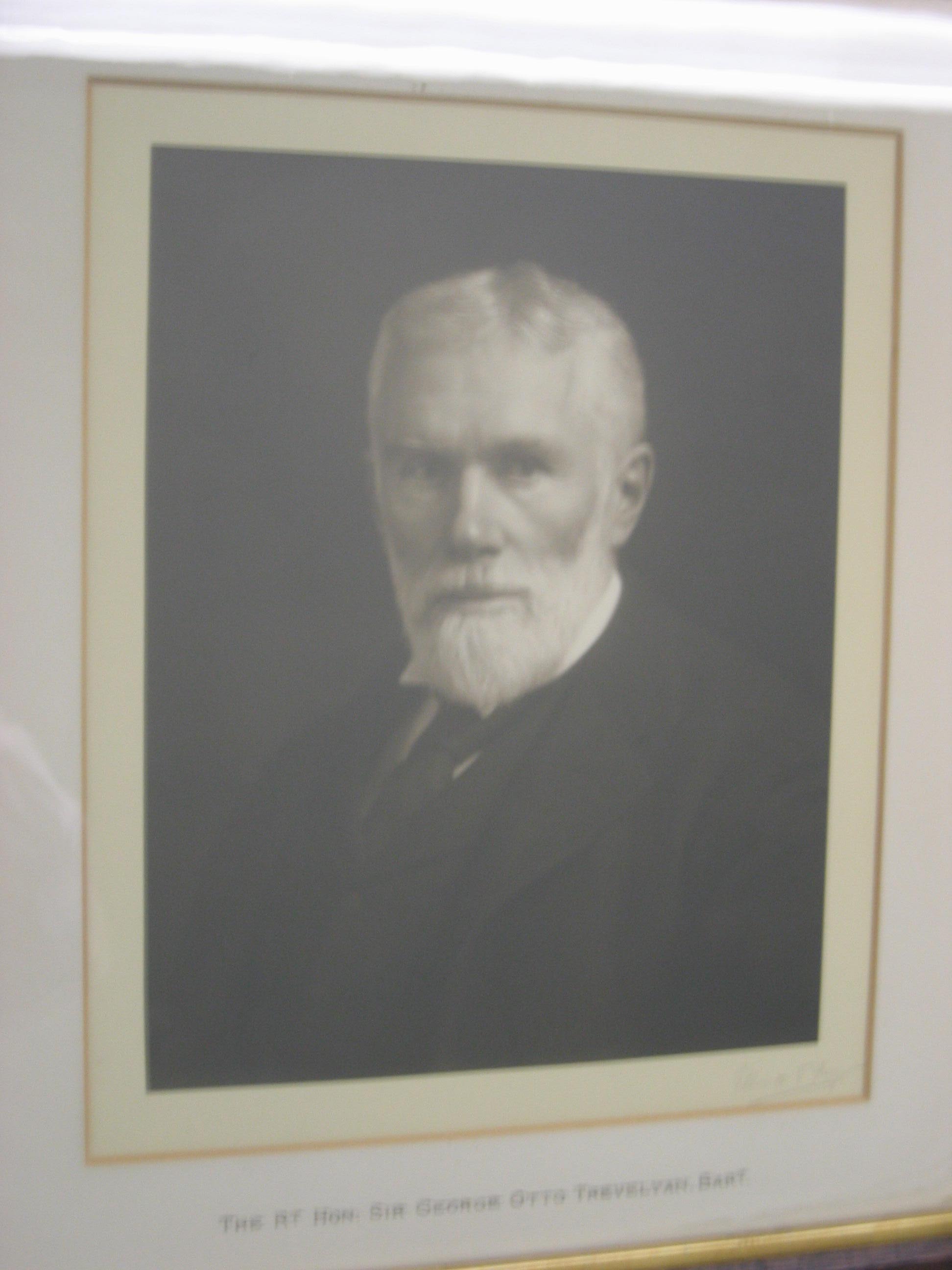- Sir George Trevelyan, 2nd Baronet
Infobox Politician
honorific-prefix =The Right Honourable
name =Sir George Otto Trevelyan, 2nd Baronet, OM,DC, LLD, DL
office =Civil Lord of the Admiralty
term_start =18 December, 1868
term_end =12 July, 1870
predecessor =Frederick Stanley, 16th Earl of Derby
successor =Robert Haldane-Duncan, 3rd Earl of Camperdown
office2 =MP for Tynemouth
term_start2 =1865
term_end2 =1868
predecessor2 =Richard Hodgson
successor2 =Thomas Eustace Smith
office3 =MP for Hawick Burghs
term_start3 =1868
term_end3 =1886
successor3 =Alexander Laing Brown
office4 =MP for Glasgow Bridgeton
term_start4 =1887
term_end4 =1897
predecessor4 =Sir Edward Richard Russell
successor4 =Sir Charles Cameronbirth_date =birth date|1838|7|20
birth_place =flagicon|EnglandEdinburgh ,England
death_date =death date and age|1928|08|17|1838|7|20Sir George Otto Trevelyan, 2nd Baronet OM, DC, LLD, DL (20 July 1838 ndash 17 August 1928) was a British
statesman andauthor was born inRothley Temple ,Leicestershire , and the only son of Sir Charles Trevelyan and Hannah Moore Macaulay. Hannah was the daughter ofZachary Macaulay , secretary of theAnti-Slavery Society and the sister of British historian Thomas Macaulay.Education
He was educated at Harrow and at
Trinity College, Cambridge where he was President of theCambridge Union Society , and earned 2nd place in the first class of theClassical Tripos in 1861. That same year he wrote his "Horace" at theUniversity of Athens , a topical drama in verse, parts of which are said to have offended Whewell and lost Trevelyan a fellowship.Office
In 1862 he went out as a civil servant to India, where he spent several years. During his stay he contributed "Letters of a Competition Wallah" to Macmillan's Magazine (republished 1864). "Cawnpore", an account of that terrible tragedy, was published in 1865. During the same year he was elected as a Liberal MP for Tynemouth. In 1867 he wrote "The Ladies in Parliament", a humorous political brochure in verse. At the general election of 1868 he was returned for the Hawick Burghs, which he continued to represent until 1886.
When the first Gladstone Ministry was formed, in December 1868, Trevelyan was appointedCivil Lord of the Admiralty , but resigned in July 1870 on a point of conscience connected with the government Education Bill. He advocated a sweeping reform of the army, including the abolition of the purchase of commissions, and both in and out of parliament he was the foremost supporter for many years of the extension of the county franchise. In the session of 1874 he brought forward his Household Franchise (Counties) Bill, which was lost on the second reading; it was not till ten years later that the agricultural laborer was enfranchized. Among other causes which he warmly supported were women's suffrage, a thorough reform of metropolitan local government, and the drastic reform or abolition of theHouse of Lords . He was also in favour of the direct veto and other temperance legislation. In 1876 he published "The Life and Letters of Lord Macaulay", and in 1880 he published "The Early History of Charles James Fox". In the latter year he was appointedParliamentary Secretary to the Admiralty . This office he held until May 1882, when, after the assassination ofLord Frederick Cavendish , he became for two yearsChief Secretary for Ireland and was appointed to thePrivy Council . From November 1884 to June 1885 he wasChancellor of the Duchy of Lancaster . In February 1886 he becameSecretary for Scotland , but resigned in March over Home Rule. The same year he succeeded his father in the baronetcy. At the general election of 1886 Sir George Trevelyan lost his seat for Hawick. As a representative of the Liberal Unionist party he took part in the Round Table Conference, and, being satisfied with the modifications made by Gladstone in his Home Rule scheme, he formally rejoined the Liberal party. In August 1887 he re-entered the House of Commons as member for Glasgow Bridgeton; and from 1892 to 1895 he was again Secretary for Scotland. Early in 1897 he resigned his seat in parliament and retired into private life.Retirement
In 1899 he published the first volume of a "History of the American Revolution", which was completed (3 vols.) in 1905; in the latter year, as Interludes in Prose and Verse, he republished his early classical jeux d'esprit and Indian pieces. He had married in 1869 Caroline Philips, whose father
Mark Philips was MP for Bury. His eldest son, Charles Philips Trevelyan (b. 1870), became Liberal M.P. for the Elland division ofYorkshire in 1899, and in 1908 was appointedParliamentary Secretary to the Board of Education . The second son wasR. C. Trevelyan , the artist. The third son,George Macaulay Trevelyan (b. 1876), became well known as a brilliant historical writer, notably with two books on Garibaldi (1907 and 1909) and his "Life of John Bright" (1911).Honours
*In 1911 He was appointed as a Member of the
Order of Merit .References
*1911
*Rayment-b
* Torrance, David, "The Scottish Secretaries" (Birlinn 2006)External links
*gutenberg author| id=George+Otto+Trevelyan | name=George Otto Trevelyan
Wikimedia Foundation. 2010.
